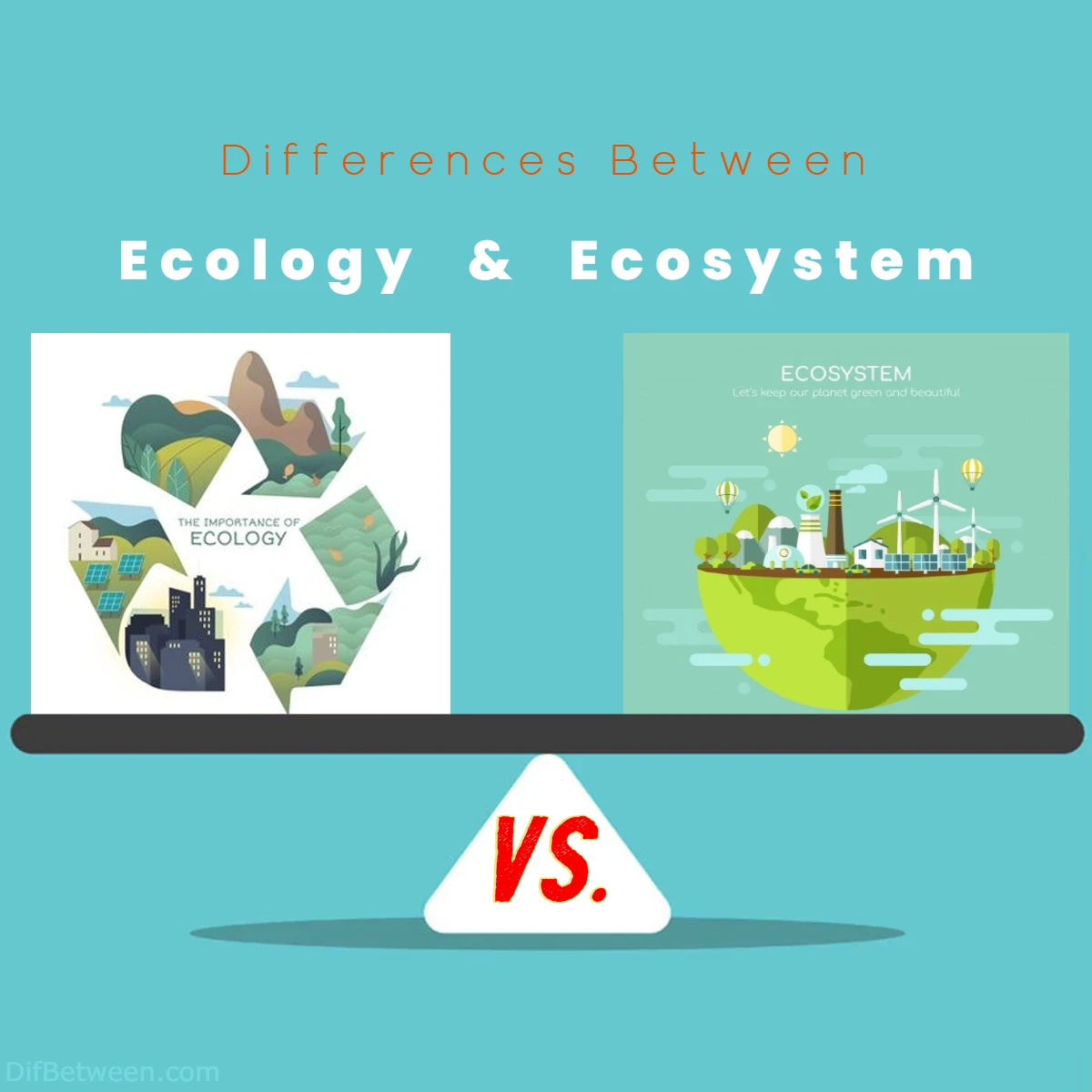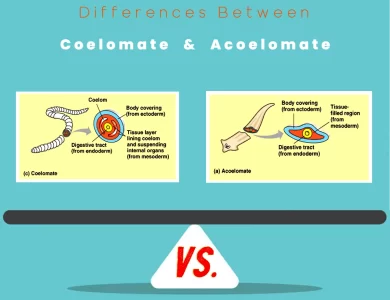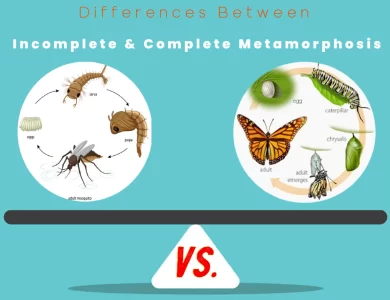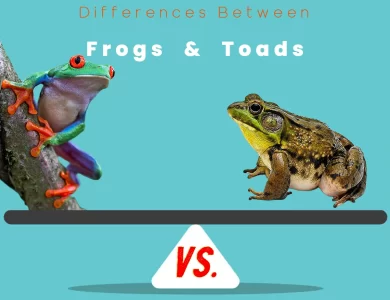
| Aspect | Ecology | Ecosystems |
|---|---|---|
| Definition | Study of interactions between organisms and their environment. | Self-contained systems comprising living organisms, their environment, and intricate relationships. |
| Scale | Broad, covering various levels of organization | Specific, defined by geographic boundaries. |
| Focus | Interactions between species, populations, and communities. | Relationships within a particular ecosystem, including biotic and abiotic factors. |
| Subfields | Population Ecology, Community Ecology, Ecosystem Ecology, Landscape Ecology, Global Ecology, and more. | No distinct subfields; ecosystems are the units of study within the broader field of ecology. |
| Spatial Boundaries | Ecological studies may transcend ecosystem boundaries, examining interactions across landscapes. | Clearly defined geographic boundaries within which ecological processes occur. |
| Temporal Scale | Can encompass both short-term and long-term studies. | Typically, focuses on long-term processes within the ecosystem. |
| Objective | To understand ecological relationships, patterns, and processes on a global or broad scale. | To study the structure, function, and dynamics of a specific ecosystem. |
Ecology, our first protagonist, is like the master storyteller of the great outdoors. It reveals the intricate tales of life, exploring the dynamic relationships between organisms and their ever-changing environments. From the microscopic drama of soil microbes to the epic migrations of charismatic megafauna, ecology casts a wide net, embracing a world teeming with interactions and interdependencies.
Differences Between Ecology and Ecosystem
The main differences between Ecology and Ecosystem lie in their scope and focus. Ecology, a broader field, studies the interactions between organisms and their environments on a global or regional scale. It encompasses various subfields such as population ecology, community ecology, and global ecology. Ecosystems, on the other hand, are self-contained units defined by specific geographical boundaries, concentrating on the relationships within a particular, well-defined environment. While ecology provides the big picture of ecological interactions, ecosystems offer a close-up view of self-sustaining ecological systems.
Defining Ecology and Ecosystems
Ecology: At its core, ecology is the scientific study of the interactions between organisms and their environments. It is the branch of biology that seeks to understand how living organisms, both individually and collectively, interact with their surroundings. These interactions encompass various factors, such as the relationships between species, the flow of energy through ecosystems, and the cycling of nutrients.
Ecosystems: An ecosystem, on the other hand, is a self-contained, functional unit within the broader landscape of ecology. It is characterized by a specific geographic area where living organisms, such as plants, animals, and microorganisms, interact with each other and their physical environment. Ecosystems can be as small as a pond or as vast as a forest, and they play a crucial role in maintaining the balance of nature.
Scope and Scale: Ecology vs. Ecosystems
Ecology
In the realm of ecology, the focus is on understanding the intricate web of relationships between living organisms and their environment. Ecologists examine how individual species adapt to their surroundings, how they interact with other species (predation, competition, mutualism, etc.), and how these interactions influence population dynamics.
Ecology operates on a broad scale, from the microscopic world of microbes to the grand ecosystems of our planet. It encompasses various subfields, each concentrating on specific aspects of ecological interactions. Here’s a glimpse of some of these subfields:
Population Ecology: This branch of ecology explores the dynamics of populations within a species. It studies factors like birth rates, death rates, and immigration/emigration to understand how populations change over time.
Community Ecology: Community ecologists delve into the interactions between different species that coexist within an ecosystem. They explore topics such as species diversity, competition, and niche partitioning.
Ecosystem Ecology: While ecosystems themselves have their own definition, ecosystem ecologists focus on the flow of energy and cycling of nutrients within these systems. They study how energy is transferred from one trophic level to another and how essential elements like carbon, nitrogen, and phosphorus cycle through ecosystems.
Landscape Ecology: At a larger scale, landscape ecologists examine how different ecosystems are spatially arranged in landscapes and how these arrangements influence ecological processes.
Global Ecology: This is the big picture. Global ecologists investigate the interactions between all living organisms on Earth and the planet’s physical systems, including the atmosphere and oceans.
Ecosystems
Ecosystems, while intimately tied to ecology, have a narrower scope in terms of scale. They are self-contained, relatively self-sufficient systems, often defined by specific geographical boundaries. Ecosystems encompass the living organisms, their physical environment, and the intricate relationships that exist within.
Ecosystems can be as small as a backyard pond or as vast as a desert. They come in all shapes and sizes, and each one is a microcosm of ecological interactions. Ecosystems are like the building blocks of ecology.
To understand the differences better, let’s take a closer look at how these two fields diverge in terms of their core aspects.
Spatial Boundaries: Where Ecology Meets Ecosystems
One of the most significant distinctions between ecology and ecosystems is the spatial scale at which they operate. While ecology can extend its inquiries beyond the confines of a single ecosystem, ecosystems are bounded by specific geographic limits.
Ecology’s Spatial Flexibility
Ecological studies often transcend the borders of individual ecosystems. Ecologists may investigate how species migration affects multiple ecosystems, or they might explore how landscape features like rivers and mountains influence ecological interactions across a region. In essence, ecology allows researchers to zoom in and out, examining interactions at various scales.
For instance, a population ecologist might study the migration patterns of birds that move between different ecosystems during their annual journeys. This research would involve understanding the interactions of these birds within their breeding and wintering grounds, which could be separate ecosystems.
Ecosystems: Defined by Geography
In contrast, ecosystems are distinctly bounded by their geographic location. They are like self-contained worlds with clear boundaries that delineate where one ecosystem ends and another begins. These boundaries are essential for understanding the unique set of organisms and ecological processes that exist within each ecosystem.
Let’s consider a forest ecosystem as an example. The boundary of this ecosystem is typically defined by the extent of the forested area. Ecologists studying this ecosystem would focus on the organisms and interactions occurring exclusively within the forest, ignoring the broader context of surrounding ecosystems.
Temporal Scale: Short-Term Ecology vs. Long-Term Ecosystems
Another difference between ecology and ecosystems lies in the temporal scale of their studies. Ecologists can examine ecological processes over both short-term and long-term periods, whereas ecosystems primarily concern themselves with long-term dynamics.
Ecological Studies: Short and Long-Term
Ecologists have the flexibility to investigate ecological phenomena occurring over varying timeframes. Short-term studies might look at the immediate effects of a forest fire on a local ecosystem, tracking how species respond in the months following the disturbance.
On the other hand, long-term ecological studies can span decades or even centuries. These investigations delve into processes that unfold gradually, such as the evolution of species or the effects of climate change on ecosystems. Long-term research provides valuable insights into the dynamic nature of ecological systems.
Ecosystems: Focusing on Long-Term Dynamics
Ecosystems, by their nature, are more oriented toward long-term dynamics. Since they are defined by specific geographic boundaries, they inherently lend themselves to the study of processes that play out over extended periods.
For example, researchers studying a coral reef ecosystem might monitor changes in coral cover and species composition over several decades to understand the long-term impacts of factors like ocean warming and pollution. Such studies are essential for assessing the resilience of ecosystems and their ability to adapt to environmental changes.
Focus of Study: Ecological Relationships vs. Ecosystem Dynamics
While both ecology and ecosystems are concerned with the natural world, their primary focus differs. Ecology zooms in on understanding the intricate relationships between species, populations, and communities, whereas ecosystems delve into the dynamics and functions of a specific ecosystem.
Ecological Relationships
Ecologists are passionate detectives of nature’s web of life. They strive to uncover the secrets of how organisms interact with each other and their environment. This includes studying predator-prey relationships, competition for resources, mutualistic partnerships, and the myriad ways species coexist.
Imagine an ecologist studying a grassland ecosystem. They might be interested in how different herbivore species share grazing resources, how predators influence herbivore behavior, and how these interactions shape the composition of the plant community. This type of research forms the heart of ecological studies.
Ecosystem Dynamics
In contrast, ecosystems focus on the holistic view of a specific system. They are more concerned with understanding the structure, function, and dynamics of that particular ecosystem. Ecosystem studies often explore questions related to nutrient cycling, energy flow, and how the abiotic (non-living) components, such as soil and climate, interact with the biotic (living) components.
Continuing with the grassland ecosystem example, an ecosystem study might examine how energy flows through the ecosystem, starting with the capture of sunlight by plants through photosynthesis. Researchers might track the movement of energy as it passes from plants to herbivores, then to predators, and ultimately, how it is recycled back into the ecosystem through processes like decomposition.
Subfields: Diverse Ecological Specializations vs. Ecosystem Unity
Ecology is a diverse field with numerous subfields, each focusing on specific aspects of ecological relationships and interactions. In contrast, ecosystems do not have distinct subfields; they are the primary units of study within the broader field of ecology.
Ecological Subfields
Ecology is a multifaceted discipline, and ecologists specialize in various subfields to gain a deeper understanding of specific ecological processes. Let’s explore some of these subfields:
1. Population Ecology: Population ecologists investigate the dynamics of populations within a single species. They analyze factors like birth rates, death rates, and the effects of environmental changes on population size.
2. Community Ecology: Community ecologists explore how different species interact within a given ecosystem. They study topics such as competition for resources, predation, and the distribution of species within communities.
3. Ecosystem Ecology: Ecosystem ecologists focus on the flow of energy and the cycling of nutrients within ecosystems. They examine processes like photosynthesis, decomposition, and nutrient uptake by organisms.
4. Landscape Ecology: Landscape ecologists consider the spatial arrangement of different ecosystems within landscapes. They study how landscape features, such as forests, rivers, and urban areas, influence ecological patterns.
5. Global Ecology: Global ecologists take a planetary perspective, investigating how ecological processes operate on a global scale. They examine phenomena like climate change, biodiversity loss, and the movement of nutrients across continents.
Ecosystems: Units of Study
In contrast to ecology’s diverse subfields, ecosystems themselves do not have specialized branches of study. Instead, they serve as the fundamental units of investigation within the broader field of ecology. Researchers may choose to study a specific ecosystem, but the principles and methodologies they employ are drawn from the various subfields of ecology.
For instance, an ecologist interested in a wetland ecosystem would draw upon the principles of population ecology, community ecology, and ecosystem ecology to understand the interactions and processes occurring within that wetland. While the focus is on the ecosystem, the tools and knowledge are rooted in ecology’s diverse subfields.
Objectives: Global Understanding vs. Ecosystem-Specific Knowledge
The ultimate objectives of ecology and ecosystems differ in terms of scale and breadth of understanding. Ecology seeks to unravel ecological relationships, patterns, and processes on a global or broad scale, while ecosystems aim to provide in-depth knowledge about the structure, function, and dynamics of a specific ecosystem.
Ecology’s Broad Perspective
Ecology is driven by a quest to comprehend the intricate workings of the natural world at a global or large-scale level. Researchers in ecology strive to uncover general principles and patterns that apply to ecosystems across diverse geographic regions. The goal is to create a comprehensive understanding of how life on Earth interacts with the environment.
For example, global ecologists might investigate the impacts of climate change on biodiversity patterns worldwide or the consequences of deforestation on carbon cycling at a planetary level. Their findings contribute to our understanding of global ecological processes.
Ecosystems’ Specific Focus
Ecosystems, by contrast, are more concerned with specific places and the fine details of their functioning. Researchers studying ecosystems aim to build a deep understanding of how a particular ecosystem operates, including its unique species composition, energy flow, and nutrient cycling.
Consider a marine biologist studying a coral reef ecosystem. Their primary objective is to gather detailed information about the reef’s species diversity, the interactions between coral and fish, and the factors influencing coral health. While their research may contribute to broader ecological principles, its immediate focus is on that specific reef ecosystem.
Methodologies: How Ecology and Ecosystems are Studied
Ecological Methodologies
Ecologists employ a wide range of research methods and tools to investigate ecological phenomena. These methodologies often vary depending on the specific subfield of ecology and the questions being addressed. Here are some common ecological research methods:
1. Field Studies: Ecologists frequently venture into the field to directly observe and collect data on organisms and their interactions. This can involve activities like bird watching, insect trapping, and vegetation sampling.
2. Laboratory Experiments: Controlled experiments in the laboratory allow ecologists to isolate specific factors and test hypotheses. For example, scientists might manipulate temperature or nutrient levels to understand their effects on plant growth.
3. Remote Sensing: The use of satellite imagery and remote sensors provides ecologists with a valuable tool to monitor large-scale ecological changes, such as deforestation, urban expansion, and climate patterns.
4. Modeling: Ecological modeling involves creating mathematical representations of ecological systems to simulate how they function. These models can help predict ecological outcomes under different scenarios.
5. Genetic Analysis: Advances in DNA sequencing and genetic techniques allow ecologists to study the genetic diversity and relatedness of populations and species.
6. Citizen Science: Engaging the public in data collection, such as reporting bird sightings or participating in biodiversity surveys, is a valuable approach to gathering large datasets.
Ecosystem Methodologies
Ecosystem studies, while drawing on many of the same methods as ecology, often emphasize a holistic understanding of specific systems. Here are some methodologies specific to ecosystem research:
1. Biogeochemical Cycling Analysis: Ecosystem ecologists extensively study the cycling of nutrients like carbon, nitrogen, and phosphorus within ecosystems. This involves measuring inputs, outputs, and transformations of these elements.
2. Energy Flow Studies: Researchers use methods such as calorimetry and stable isotope analysis to track the flow of energy through ecosystems, from primary producers (plants) to consumers (animals) to decomposers.
3. Long-Term Monitoring: Many ecosystem studies involve continuous, long-term data collection to observe gradual changes and trends. This can include monitoring weather patterns, species populations, and nutrient levels.
4. Carbon and Water Flux Measurement: Ecosystem researchers measure the exchange of carbon dioxide and water vapor between ecosystems and the atmosphere, which is crucial for understanding carbon cycling and climate regulation.
5. Remote Sensing for Ecosystems: Remote sensing techniques, like satellite imagery and LiDAR (Light Detection and Ranging), are used to assess the structure and health of ecosystems, such as forests and wetlands.
Practical Applications: How Ecology and Ecosystems Benefit Society
Ecology and ecosystems research have far-reaching practical applications that impact our daily lives and the well-being of our planet. Let’s explore some of the essential applications in each field.
Ecological Applications
1. Conservation: Ecological research informs conservation efforts by identifying endangered species, assessing habitat loss, and understanding the impacts of human activities on biodiversity. This knowledge guides the development of conservation strategies and policies.
2. Pest Management: Ecological studies help develop sustainable pest management practices that reduce the need for chemical pesticides and promote natural predator-prey interactions.
3. Sustainable Agriculture: Understanding ecological interactions in agricultural ecosystems can lead to more sustainable farming practices, such as crop rotation, integrated pest management, and soil conservation.
4. Biodiversity Assessment: Ecological surveys and monitoring aid in assessing the health of ecosystems and tracking changes in species diversity. This information is vital for making informed decisions about land use and development.
5. Restoration Ecology: Ecologists play a crucial role in restoring damaged ecosystems. They use their knowledge to guide efforts to rehabilitate areas affected by pollution, deforestation, or other disturbances.
6. Climate Change Mitigation: Ecological research contributes to our understanding of climate change impacts and potential mitigation strategies. For example, studying carbon cycling in forests helps us evaluate their role in sequestering carbon dioxide.
Ecosystem Applications
1. Ecosystem Management: The study of ecosystems informs sustainable management practices. For example, understanding the nutrient cycling in a forest ecosystem helps foresters make decisions about harvesting and replanting.
2. Wetland Conservation: Ecosystem research aids in the preservation of wetlands, which provide essential services like water purification and flood control.
3. Carbon Sequestration: Ecosystems like forests and wetlands are significant carbon sinks, absorbing and storing atmospheric carbon dioxide. This knowledge informs climate change mitigation strategies.
4. Fisheries Management: Ecosystem-based fisheries management considers the entire marine ecosystem when setting regulations to ensure the sustainability of fish populations.
5. Urban Planning: Urban planners use ecosystem research to design cities that integrate green spaces and natural habitats, promoting the well-being of both humans and the environment.
6. Environmental Impact Assessment: Understanding how ecosystems function is crucial in assessing the potential impacts of development projects, such as infrastructure construction or land-use changes.
Interconnectedness: The Bridge Between Ecology and Ecosystems
While ecology and ecosystems have distinct focuses and methodologies, they are undeniably interconnected. Ecology provides the fundamental understanding of how individual species interact with each other and their environment. This knowledge forms the building blocks of ecosystem studies, allowing researchers to explore the complex dynamics of self-contained systems.
Consider the relationship between a population of herbivores and the vegetation they consume. Ecologists might investigate the factors influencing the herbivore population size and behavior. This information, in turn, becomes a vital component of understanding the energy flow and nutrient cycling within the ecosystem they inhabit.
In essence, ecology provides the keys to unlock the mysteries of ecosystems. It equips us with the knowledge needed to comprehend the intricate relationships, patterns, and processes that play out within the boundaries of specific geographic locations.
FAQs
Ecology is the scientific study of how living organisms interact with each other and their environments. It explores a wide range of ecological relationships and processes on a global or regional scale.
Ecosystems are self-contained, functional units within ecology, characterized by specific geographic boundaries. They encompass the interactions between living organisms, their physical environment, and intricate relationships within a well-defined area.
Ecology operates on a broad scale, from microscopic organisms to global ecosystems. Ecosystems are specific and defined by geographic boundaries, focusing on a particular environment’s dynamics.
Ecology primarily focuses on the interactions between species, populations, and communities, studying ecological relationships, patterns, and processes at various levels of organization.
Ecosystems concentrate on understanding the relationships within a specific, bounded environment, including both biotic (living) and abiotic (non-living) factors, emphasizing their structural and functional aspects.
Ecology boasts diverse subfields such as population ecology, community ecology, and global ecology, each specializing in specific aspects of ecological study. Ecosystems do not have distinct subfields; they are the primary units of study within ecology.
Ecology encompasses both short-term and long-term studies, whereas ecosystems primarily focus on long-term processes within the ecosystem itself.
Ecology seeks to understand ecological relationships, patterns, and processes on a global or broad scale, aiming to uncover general principles. Ecosystems aim to provide in-depth knowledge about the structure, function, and dynamics of a specific ecosystem.
Ecology provides the foundational understanding of ecological interactions and relationships, which forms the basis for ecosystem studies. Ecosystems offer a detailed perspective on how these interactions manifest within specific environments, linking the two fields together.
Ecology contributes to conservation, sustainable agriculture, pest management, and climate change mitigation. Ecosystem research guides ecosystem management, wetland conservation, carbon sequestration, fisheries management, urban planning, and environmental impact assessment.
Read More:
Contents
- Differences Between Ecology and Ecosystem
- Defining Ecology and Ecosystems
- Scope and Scale: Ecology vs. Ecosystems
- Spatial Boundaries: Where Ecology Meets Ecosystems
- Temporal Scale: Short-Term Ecology vs. Long-Term Ecosystems
- Focus of Study: Ecological Relationships vs. Ecosystem Dynamics
- Subfields: Diverse Ecological Specializations vs. Ecosystem Unity
- Objectives: Global Understanding vs. Ecosystem-Specific Knowledge
- Methodologies: How Ecology and Ecosystems are Studied
- Practical Applications: How Ecology and Ecosystems Benefit Society
- Interconnectedness: The Bridge Between Ecology and Ecosystems
- FAQs






